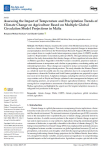Scicluna B.M., Galdies C. (2025). Assessing the impact of temperature and precipitation trends of climate change on agriculture based on multiple global circulation model projections in Malta. Big Data and Cognitive Computing, 01/04/2025, vol. 9, n. 4, p. 105.
https://doi.org/10.3390/bdcc9040105
https://doi.org/10.3390/bdcc9040105
| Titre : | Assessing the impact of temperature and precipitation trends of climate change on agriculture based on multiple global circulation model projections in Malta (2025) |
| Auteurs : | B.M. Scicluna ; C. Galdies |
| Type de document : | Article |
| Dans : | Big Data and Cognitive Computing (vol. 9, n. 4, April 2025) |
| Article en page(s) : | p. 105 |
| Langues : | Anglais |
| Langues du résumé : | Anglais |
| Catégories : |
Catégories principales 07 - ENVIRONNEMENT ; 7.6 - Changement ClimatiqueThésaurus IAMM CHANGEMENT CLIMATIQUE ; EVALUATION DE L'IMPACT ; AGRICULTURE ; MALTE |
| Résumé : | The Maltese Islands, situated at the centre of the Mediterranean basin, are recognised as a climate change hotspot. This study utilises projected changes in temperature and precipitation derived from the World Climate Research Program (WCRP) and analyses outputs from six coupled model intercomparison project phase 5 (CMIP5) models under two Representative Concentration pathways (RCPs). Through statistical and spatial analysis, the study demonstrates that climate change will have significant adverse effects on Maltese agriculture. Regardless of the RCP scenario considered, projections indicate a substantial increase in temperature and a decline in precipitation, exacerbating aridity and intensifying heat stress. These changes are expected to reduce soil moisture availability and challenge traditional agricultural practices. The study identifies the Western District as a relatively more favourable area for crop cultivation due to its comparatively lower temperatures, whereas the Northern and South Eastern peripheries are projected to experience more severe heat stress. Adaptation strategies, including the selection of heat-tolerant crop varieties such as Tetyda and Finezja, optimised water management techniques, and intercropping practices, are proposed to enhance agricultural resilience. This study is among the few comprehensive assessments of bioclimatic and physical factors affecting Maltese agriculture and highlights the urgent need for targeted adaptation measures to safeguard food production in the region. |
| Cote : | En ligne |
| URL / DOI : | https://doi.org/10.3390/bdcc9040105 |







